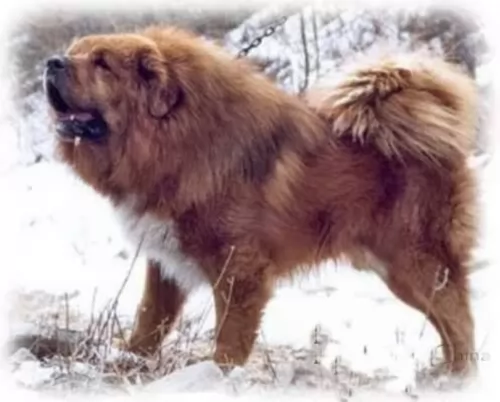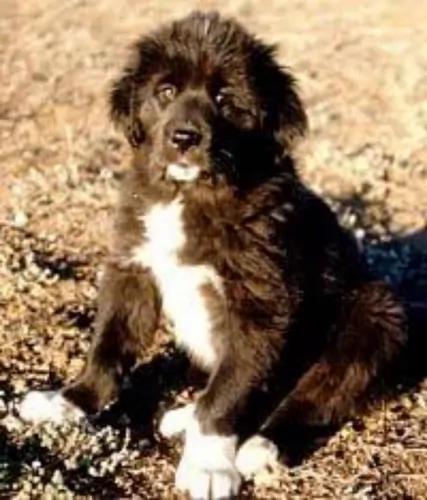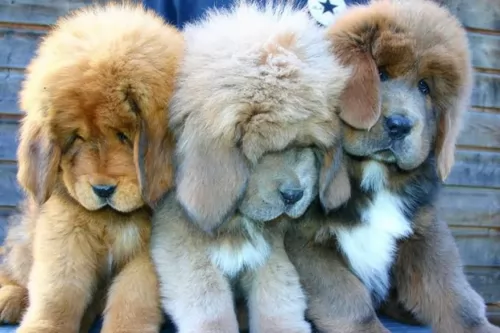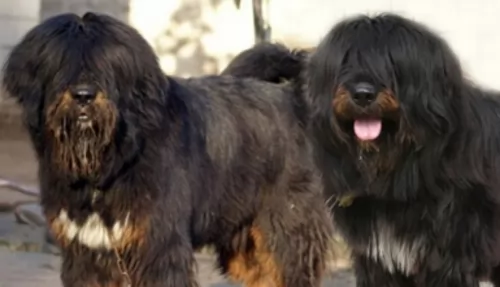 Petzlover
Petzlover Field Spaniel is originated from United Kingdom but Tibetan Kyi Apso is originated from China. Field Spaniel may grow 25 cm / 9 inches shorter than Tibetan Kyi Apso. Field Spaniel may weigh 20 kg / 44 pounds lesser than Tibetan Kyi Apso. Both Field Spaniel and Tibetan Kyi Apso has same life span. Both Field Spaniel and Tibetan Kyi Apso has same litter size. Both Field Spaniel and Tibetan Kyi Apso requires Moderate Maintenance.
Field Spaniel is originated from United Kingdom but Tibetan Kyi Apso is originated from China. Field Spaniel may grow 25 cm / 9 inches shorter than Tibetan Kyi Apso. Field Spaniel may weigh 20 kg / 44 pounds lesser than Tibetan Kyi Apso. Both Field Spaniel and Tibetan Kyi Apso has same life span. Both Field Spaniel and Tibetan Kyi Apso has same litter size. Both Field Spaniel and Tibetan Kyi Apso requires Moderate Maintenance.
 The Field Spaniel was developed to retrieve game, being developed in 19th century England as a hunting companion. Today they are still used as hunting dogs but he is essentially a family companion and show dog.
The Field Spaniel was developed to retrieve game, being developed in 19th century England as a hunting companion. Today they are still used as hunting dogs but he is essentially a family companion and show dog.
He was developed to be a medium-sized, all-black dog. Until 1901, spaniels were divided by weight, with the Field Spaniel being the bigger dog.With developing the breed, the Basset Hound was introduced and then English Springer Spaniels were also brought into the mix.
Today the Field Spaniel is still a rare breed even in the UK. To promote the breed, the dog has been registered as a Vulnerable Native Breed by the Kennel Club.
 The Tibetan Kyi Apso is an ancient rare breed. In fact, it is one of the rarest breeds on earth. Coming from Tibet, the Kyi Apso guarded livestock and homes for the nomads of the “rooftop of the world”. Apso means bearded and Kyi meand dog thus the Kyi Apso is a bearded dog.
The Tibetan Kyi Apso is an ancient rare breed. In fact, it is one of the rarest breeds on earth. Coming from Tibet, the Kyi Apso guarded livestock and homes for the nomads of the “rooftop of the world”. Apso means bearded and Kyi meand dog thus the Kyi Apso is a bearded dog.
This breed is very intelligent with a great personality and charm. In Western countries the breed is called Apso Do-Kyi or the Tibetan Collie. The first time these dogs are mentioned in any kind of documents was the late 19th and early 20th centuries in writings about Central Asian dogs. The Kyi Apso is related to the Tibetan Mastiff.
The breed is known to have been imported by Captain George Augustus Graham as a Tibetan wolf dog. The dog was also known to be owned by the 13th Dali Lama. There have not been many exported to Europe or North America, with the first coming to North America in the 1970’s.
There have been no registered litters since 2000 and the Tibetan Kyi Apso Club closed in 1999.
 The Field Spaniel is a medium sized dog, standing at 43–46cm in height and weighing between 18–25kg. The single coat of the Field Spaniel is fairly long with the traditional feathering at the legs, belly, chest and tail.
The Field Spaniel is a medium sized dog, standing at 43–46cm in height and weighing between 18–25kg. The single coat of the Field Spaniel is fairly long with the traditional feathering at the legs, belly, chest and tail.
The coat comes in solid colours of black, liver or roan. You might also find some ticked markings of white. The tail of the Field Spaniel is traditionally docked with the ears being long and floppy.
Happy, busy and active, the Field Spaniel makes an excellent family pet. They get on well with children and with other pets in the home. It is the kind of dog, that while friendly with all members of his human family, he forms a strong bond with one member whom he regards as special.
Bright and intelligent, he is also a dog that does well when socialized and trained, being more docile and less excitable than Cocker spaniels. The Field Spaniel is a dog who thrives on being busy and won’t relish lying around with nothing to do. He loves water and where there is a dam or pond, he’ll be there and want you to join him.
 The Tibetan Kyi Apso is a large dog with a bearded face, full coat and curled tail. They have longer hair than the Mastiff and of course the shaggy, bearded muzzle. It is not as hefty as the Mastiff of course, and he is more athletic. Like many primitive dogs before them, the Kyi Apso comes into heat only one time a year, contributing to the rareness of the breed.
The Tibetan Kyi Apso is a large dog with a bearded face, full coat and curled tail. They have longer hair than the Mastiff and of course the shaggy, bearded muzzle. It is not as hefty as the Mastiff of course, and he is more athletic. Like many primitive dogs before them, the Kyi Apso comes into heat only one time a year, contributing to the rareness of the breed.
With their bearded face, the breed’s head appears bigger than it is. The ears are shaped as a V and skull is flat with the eyes on the outside of it. Their muzzle looks larger than it is due to the beard. Nose and lips are black, eyes are amber and almond shaped.
The coat is double, sheds odors and molts once a year. The coat can be black and tan, shades of red, blue-gray with white and solid black.
 Once people have owned any of the Spaniel breeds, they discover what a wonderful friend the dog is. He is loyal, loving, protective, brave, confident, fun-loving and smart. He isn’t aggressive but he may not like a stranger to reach out and pat him.
Once people have owned any of the Spaniel breeds, they discover what a wonderful friend the dog is. He is loyal, loving, protective, brave, confident, fun-loving and smart. He isn’t aggressive but he may not like a stranger to reach out and pat him.
The Field Spaniel is a wonderful dog and he will adapt to life in the city or in the countryside, just so long as he has his beloved human family close by.
 The Field Spaniel is a robust dog breed and can live to be 12 – 14 years of age. Apart from watching for ear infections with his long ears, there are some common dog illnesses that are worth knowing about -
The Field Spaniel is a robust dog breed and can live to be 12 – 14 years of age. Apart from watching for ear infections with his long ears, there are some common dog illnesses that are worth knowing about -
Most older dogs have hardening of the lens and this is when the lens turns a whitish or greyish colour. However if your dog has cloudy eyes, it doesn’t simply mean he can’t see well as he often can. Once a lens has a cataract, some people try nutritional support of the lens which can work to lessen the severity of developing cataracts.
Surgery can help but a veterinary ophthalmologist can determine if cataract surgery is needed as most times it isn’t. If you can’t afford surgery, it is still important to have your dog evaluated by a veterinary ophthalmologist so that you avoid further complications with your pet’s eyes.
Progressive Retinal Atrophy is another eye disease, a degenerative disease that affects the photo-receptor cells where they deteriorate over time and can eventually lead to blindness in the affected dog.
 Bloat: Fatal unless treated immediately by a vet. Common to this size dog and can be controlled by eating habits.
Bloat: Fatal unless treated immediately by a vet. Common to this size dog and can be controlled by eating habits.
Other than these the Tibetan Kyi Apso is an ancient dog and very healthy as they were mostly isolated and did not interbreed. No genetic predetermined health problems.
 The Field Spaniel has medium-length to long hair and to avoid matting of the hair, the coat will need to be brushed a least twice a week. Many Spaniel owners take their pets to professional groomers to get the coat and ears trimmed.
The Field Spaniel has medium-length to long hair and to avoid matting of the hair, the coat will need to be brushed a least twice a week. Many Spaniel owners take their pets to professional groomers to get the coat and ears trimmed.
Check your Spaniels ears inside and out regularly, because loving water the way he does, the ears inside can remain damp and become a breeding spot for infection.
Remember to also check your Field Spaniel’s teeth as dental disease can be the root cause of many diseases.
Your Field Spaniel is an active breed and you want to be sure to feed him a high-quality commercially manufactured dog food which has been formulated for his activity level. Every now and again mix in some cooked brown rice, vegetables and chicken and also add in a bit of raw meat from time to time. Ensure cool, fresh water is always available.
 1Feeding the puppy – grow quickly don’t overfeed. High quality large breed puppy food and feed 4 small meals a day.
1Feeding the puppy – grow quickly don’t overfeed. High quality large breed puppy food and feed 4 small meals a day.
2.Feeding the adult – don’t over feed and don’t feed right before or after exercise due to the possibility of bloat. Feed high quality adult large breed dog food 2 x day in smaller meals.